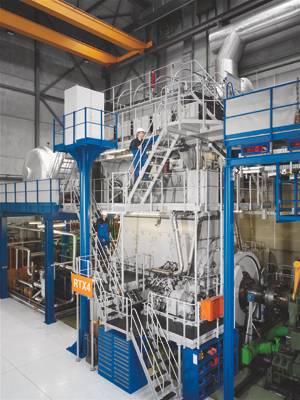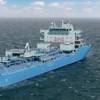Wärtsilä Inaugurates Research Engine in Switzerland
Wärtsilä Corporation inaugurated its new RTX-4 full-scale, low-speed research engine in its Diesel Technology Centre in . This large, RTX-4 research engine is employed in furthering the development of Wärtsilä low-speed marine engines to meet market needs such as further improved reliability, longer times between overhauls, greater fuel efficiency and lower exhaust gas emissions, especially NOX and CO2.
Wärtsilä low-speed engines developed on the basis of the research carried out on this engine will be employed for the propulsion of all types and sizes of sea-going ships built around the world. These play an important role in everyday life as the world fleet of ships carries some 90% of international freight transport.
The engine incorporates the latest RT-flex common-rail technology.
The new, RTX-4 research engine is a four-cylinder low-speed two-stroke engine of 600 mm cylinder bore. Initially it develops 10,160 kW at a nominal speed of 114 rpm. The design of the engine allows the power output to be increased to develop technologies for future market requirements. The engine incorporates the latest RT-flex common-rail technology with integrated full electronic control of all engine processes: fuel injection, exhaust valve operation, cylinder lubrication and air starting.
The RTX-4 was manufactured in co-operation with 3. Maj Shipbuilding Industry Ltd in , and began running in April 2008. In the short term, it will undergo a comprehensive test program to optimize further the thermo-dynamic parameters and to validate the design. It will also serve as a powerful research tool to pave the way for future technological steps. The main areas of research with the new engine include engine efficiency, emission reduction technologies, reliability of key engine components, ease of manufacturing and low maintenance costs. It has the flexibility to apply and test new components and technologies.
The research engine can be tested on any type of heavy fuel oil without restrictions on the fuel specification. Today this is of major importance as research can be undertaken using similar fuels as production engines in actual service. It will also allow future research into the capabilities of engines to burn even lower grades of fuel oil should the quality of future bunkers be expected to deteriorate. Thus the Diesel Technology Centre is pivotal to the activities of Wärtsilä in which is the group's centre of excellence for low-speed two-stroke marine diesel engines with respect to design, development, research, marketing, licensing, sales, servicing and support















